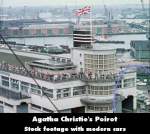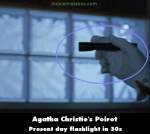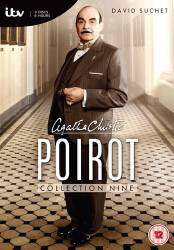The Mysterious Affair at Styles - S3-E1
Factual error: The movie opens with Hastings watching a news film about the "New Flanders Offensive." It says that on "7th June 1917 General Haig attacks Ypres", but at the beginning of the year Sir Douglas Haig was promoted to Field Marshall. A news propaganda reel would surely have called him with the appropriate title. (00:00:35)
The Mysterious Affair at Styles - S3-E1
Factual error: At the local food store, Poirot is talking with the shopkeeper. In the background are plenty of food packages that show the great care for authenticity that is a mark of the series. I feel like disputing at least a couple; the Polly box with a parrot is a Taormina American-made can that should be a product of the 20s, and the Brown and Polson's Patent Corn Flour has a claim on the box that says "65 years world-wide reputation." The patent is a 1856 one and the annexed name is from 1859 (previous ads with established date show that year as the one they started counting from); in 1917 the box would have not said "65 years", it hadn't even reached 60. (00:19:20)
The Mysterious Affair at Styles - S3-E1
Factual error: Poirot is taking a break from the prosecution' speech and is walking with Hastings, explaining to him Mary Cavendish's jealousy. In the street, they pass by a truck (registration plate MR 5496) that is a Morris-Commercial 1-Ton model. Morris began productions in the early 20s, and we are in 1917 for this episode. (01:17:45)
How Does Your Garden Grow? - S3-E2
Factual error: At the very beginning of the episode, Katrina visits the Soviet embassy. It is written in big letters; "Union of the Soviet Socialist Republic", while the correct official name was "Union of Soviet Socialist Republics." (00:01:45)
How Does Your Garden Grow? - S3-E2
Factual error: Poirot and Miss Lemon go to the riding school to meet the solicitor of the deceased. Parked in the road right as the camera pans, and featured for a few seconds, is a car Morris Eight series II, a 1938 model while the episode (as made abundantly clear by the fair invite and banner) is set in 1935. (00:28:25)
The Million Dollar Bond Robbery - S3-E3
Factual error: As the title of the episode says, it's a million dollar robbery, in bonds. Problem is, as seen when the bag is loaded, the million is in 50 dollar bonds, which was the lowest single denomination for Liberty Bonds. 20,000 big bond notes would never fit in that bag, and would weigh a lot! Funny mistake, considering that the reality of 'weight' of a sum is a problem in many movies dealing with regular dollar bills, but bonds would have much fewer limitations as for the denomination of a single note (could have been a pile of bonds worth $10,000 or $5,000). (00:19:50)

The Million Dollar Bond Robbery - S3-E3
Factual error: The stock footage of the Queen Mary coming back from the US and docking in Southampton is not in black and white, and it certainly is more recent. The crowd wears colorful clothes, no hats, neon lights are used for the building illumination, and the cars parked are of modern design. It's a post-WW2 world, not 1936. (00:38:40)
Factual error: Florence Carrington is killed on the train while she is leaving London for the weekend. When Poirot and Hastings examine the newspapers she could have been looking the day she was killed, the headline of "The evening news" in Poirot's hand announces the world record set by Malcolm Campbell at Bonneville Salt Flats in Utah, which happened on 3 September 1935, a Tuesday. (00:27:40)
Factual error: At the end of the episode, Hastings is reading a sports newspaper. The episode is set in 1935, and a weekend, but what he is reading there announces the jockey Billy Parvin substituting Fawcus riding Galdennis, and Golden Miller and the ticket for the sweeps, making the newspaper a March of 1933 one. (00:50:55)
Wasps' Nest - S3-E5
Factual error: When we see the cover of Vogue magazine where Molly Deane appears, the recreation is not bad (the lettering used is not a classic Vogue one but something very similar was used for instance in August of the same year as portrayed), but the bar at the bottom gets the date wrong, putting it down as September 10th 1935, when Vogue always had 1st and 15th of the month as date of the release, no matter the day of the week. Also, it completely omits for instance the price. Would be a pretty difficult magazine to sell without that, real Vogue covers have that detail prominently displayed. (00:03:20)
Wasps' Nest - S3-E5
Factual error: When John Harrison check out of the organizer, the days of the week are wrong for a 1935 setting (September 24th is a Monday, etc), looks like a 1934 one. (00:12:00)
The Tragedy at Marsdon Manor - S3-E6
Factual error: It is well established that the episode takes place in 1935 (Nairobi Daily Press dated Saturday July 27 1935, the poster in town advertises the meeting for "Today, Wednesday September 4th", day of the week consistent with the year), but Poirot and Hastings are stopped on their way to the train station by a Wolseley Series II - 14/56, a model that entered production in mid 1936. (00:17:00)

Factual error: Attention to detail in props is always extremely high in this series, and tubular flashlights have been in circulation since the beginning of the century. However the one that the supposed burglar is holding as they make their way through the top floor of the villa looks perfectly modern and unlike any model compatible with the 30s. (00:10:20)
Factual error: Hastings and Miss Lemon decide to investigate on their own. In the outside view of the first suspect they go question, a large contrail is visible on the left of his building (contrails were not a complete impossibility in the 30s, but it's rather odd to randomly see one in an establishing shot for this timeframe). (00:22:40)
Factual error: Poirot is visiting an art exhibition with the Countess, and expresses his admiration for a painting by Marc Chagall. Amazingly enough, that painting is "Les Plumes en Fleurs", something Chagall will create in 1943, years after the time when this pre-WW2 episode takes place. (00:24:50)
Factual error: At the party, Marcus Hardman tells Bernard that the Countess recently arrived from Russia, and she describes herself as being in exile. Which made sense in the source material, set right after the Russian Revolution, but less sense in this adaptation, set in the mid 1930s. If she stayed in Russia that long, she would have spent 15-20 years with zero privileges from her rank at that point, and nothing from her old wealth, seized by the communist government.





